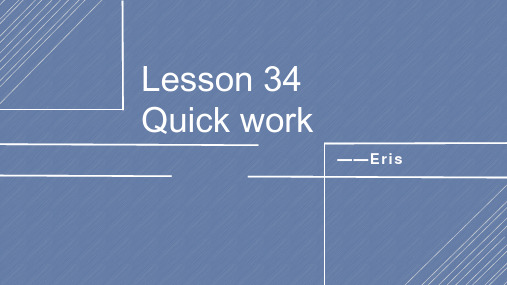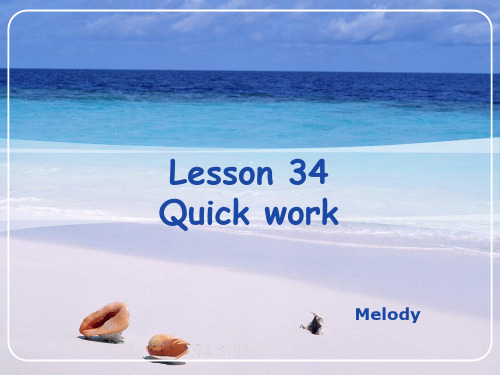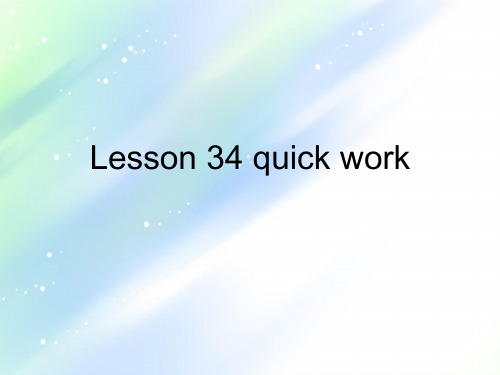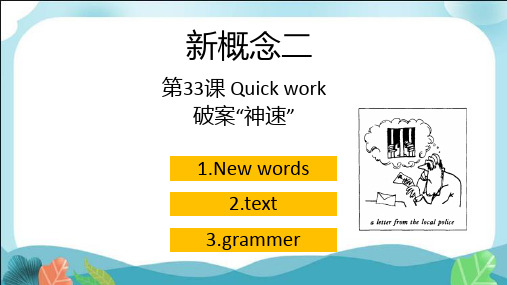新概念2-第34课PPT课件
合集下载
新概念英语第二册Lesson+34+课件+

station most /5steIF[n//m[Jst/
most
Look, listen and answer
Q1: Where did he go yesterday? Q2: What have the police found? Q3: When was his bicycle stolen?
are working day and night.
A. is building B. is being built C. will build D. be building
4.Nick had an unusually clever mind, so his success had been
B and never in doubt.
Fill in the blanks 2
Quick work Dan Robinson has been _w_o_rr_i_ed_ all week. Last Tuesday he r_e_c_e_iv_e_d a letter from the local police. In the letter he was _a_s_k_e_d_ to __c_a_ll__at the station. Dan _w_o_n_d_er_e_d_ why he was _w_a_n_te_d_ by the police, but he __w_e_n_t__ to the station yesterday and now he is not _w_o_rr_i_ed_anymore. At the station, he was __t_o_ld__ by a smiling policeman that his bicycle had been _f_o_u_n_d_. Five days ago, the policeman __to_l_d_ him, the bicycle was _p_i_ck_e_d_ up in a small village four hundred miles away. It is now being __se_n_t__ to his home by train. Dan was most surprised when he __h_ea_r_d_ the news. He was amused too, because he never _e_x_pe_c_t_e_d the bicycle to be __fo_u_n_d__. It was _s_t_o_le_n_ twenty years ago when Dan was a boy of fifteen!
新概念第二册34课课件

5. What time of day was it?
Questions?
6. Which way did she swim?
7. How long did she spend in the water?
8. How far did she swim?
9. When did she see a light ahead of her?
2.the local police,当地警察局。 local 可以表示"地方性的"或"当地的"、"本地的":adj. local
newspaper 地方性报纸
local news 本地新闻
local shops邻近的商店
第二十页
课ቤተ መጻሕፍቲ ባይዱ分析
3.Dan wondered why he was wanted by the police…丹奇怪 警察为什么找他…… (1) wonder表示"想知道"时后面往往跟疑问词引导的从句: She wondered who that man was/ what had happened. 她 想知道那个人是谁/到底发生了什么事。 (2) want用于被动语态时可以表示"想与(某人见面、谈话 等)"或"缉拿"、"追捕":
Spend, covered, saw, knew, near, cliffs, arrive, struggle up, remember, woke up, found, in hospital
A: Hello,… How are you feeling now?
B: …
A: You are so brave. We’re proud of you. May I ask you some questions?
Questions?
6. Which way did she swim?
7. How long did she spend in the water?
8. How far did she swim?
9. When did she see a light ahead of her?
2.the local police,当地警察局。 local 可以表示"地方性的"或"当地的"、"本地的":adj. local
newspaper 地方性报纸
local news 本地新闻
local shops邻近的商店
第二十页
课ቤተ መጻሕፍቲ ባይዱ分析
3.Dan wondered why he was wanted by the police…丹奇怪 警察为什么找他…… (1) wonder表示"想知道"时后面往往跟疑问词引导的从句: She wondered who that man was/ what had happened. 她 想知道那个人是谁/到底发生了什么事。 (2) want用于被动语态时可以表示"想与(某人见面、谈话 等)"或"缉拿"、"追捕":
Spend, covered, saw, knew, near, cliffs, arrive, struggle up, remember, woke up, found, in hospital
A: Hello,… How are you feeling now?
B: …
A: You are so brave. We’re proud of you. May I ask you some questions?
新概念第二册 Lesson 34课件

课文分析
【2】Last Tuesday he received a letter from the local police.
★local adj. 当地的,本地的
local news 当地新闻 local color 地方特色 local people 当地人
native ['neɪtɪv] n. 土著人 adj. 土生土长的
【练一练】 这是这个家庭最有趣的照片。 This is the most interesting photo of the family.
单词讲解
many和much的最高级 many--more--most much--more--most most绝大多数的(前面不加冠词)
例:大多数的男孩喜欢足球。 Most of the boys like football. 【练一练】:他们中的大多数都迟到了。 Most of them were late.
She wondered who that man was/ what had happened. 她想知道那个人是谁/到底发生了什么事。
She wondered what the child was doing. 她想知道那个孩子在干吗。
I wonder whether/if he will come. 我想知道他来不来。
For some reason, they called off the party.
【练一练】开始下雨了所以我们取消了比赛。
It began to rain so we called off the match.
【练一练】
1. I called _o_n__ you five times yesterday. Were you out?
新概念2精品课件Lesson34

课文精讲
There is always hope that…
老外比较偏爱
there be 结构。
课文精讲
1 there be 结构与情态动词连用。
也许有个… There may be better solution to the problem. 必须得… There must be a person to cook the dinner. 毫无疑问 There can be no doubt about it.
有个离家很近的公车站是个很大的优势 There being a bus stop near to the house is a great advantage.
课文精讲
We were annoyed at there being so much time wasted.
让人吃惊的是竟然没有任何反对意见 It would be surprising for there not to be any objections
Vocabulary
Fascination 魅力,迷惑力 中国艺术对她有很大的吸引力 Chinese art has a great fascination for foreigners. 。
结合26 exert an influence on…? Chinese art exerts great fascination on foreigners. 结合9:Cats never fail to fascinate human beings. Chinese art never fails to fascinate foreigners. 结合29:certain funny situations have a universal appeal. Chinese art holds a peculiar appeal for foreigners.
新概念2第34课

Lesson 34
Quick work
Words
nat•ivweoanddje.r本国v.的想,本知地道的 n.本地人;土著人 • local adj. 地方性的,当地的,本地的 • station n. (警察)局
①见②解••aadd等mavjm.).o大非su多常tse数,的很a,(dv大相.v部当.娱相分于乐当的ver;,y使非M,但o发常s通t笑常do,用c使t于or愉表s 达快do主n’观t感s情mo、ke
been found).
<Note 4>
Five days ago, the policeman told
him, the bicycle was picked up in a
small village four hundred miles away.
3.pick up (偶然地、意外地)找到、获得、学会 <Note 5>
访问
④ call out
大声叫喊
⑤ call off
取消(某项活动)
⑥ call in
召集
cthaell lioncal police召. 集
In the letter he was asked to call at the
station.
Dan wondered (why he was wanted by the
police),but he went to the station yesterday
and now he is not worried anymore.
2.not......any more/longer = no more/longer
不再, 再也不
<Note 3>
Quick work
Words
nat•ivweoanddje.r本国v.的想,本知地道的 n.本地人;土著人 • local adj. 地方性的,当地的,本地的 • station n. (警察)局
①见②解••aadd等mavjm.).o大非su多常tse数,的很a,(dv大相.v部当.娱相分于乐当的ver;,y使非M,但o发常s通t笑常do,用c使t于or愉表s 达快do主n’观t感s情mo、ke
been found).
<Note 4>
Five days ago, the policeman told
him, the bicycle was picked up in a
small village four hundred miles away.
3.pick up (偶然地、意外地)找到、获得、学会 <Note 5>
访问
④ call out
大声叫喊
⑤ call off
取消(某项活动)
⑥ call in
召集
cthaell lioncal police召. 集
In the letter he was asked to call at the
station.
Dan wondered (why he was wanted by the
police),but he went to the station yesterday
and now he is not worried anymore.
2.not......any more/longer = no more/longer
不再, 再也不
<Note 3>
新概念2 第34课(共66张PPT)

hear us. • I called _a_t__ the post office on my
way to work. • “Help!” the injured called _ou_t__to the
rescue team.
3、Ted wondered why he was wanted by the police, but he went to the station yesterday and now he is not worried any more.
He has accepted our invitation. 我没有收到你的传真。 I didn’t receive your fax. accept: 强调主动地或自愿地接受,或者说,
经过考虑后同意接受。 receive: 着重仅仅接到或收到这一结论或事实,
而不含采取主动或积极行动的意思。
rob 与 steal 的用法区别
• They stole a lot of money from the bank. 他们从银 行偷了很多钱。
coach
-What does he/she do? -He/She is a …
pilot
-What does he/she do? -He/She is a …
manager
-What does he/she do? -He/She is a …
policeman (policemen)
Police Station
•Have you ever been to a police station?
-What do you do? -I’m a student.
-What does he/she do? -He/She is a …
way to work. • “Help!” the injured called _ou_t__to the
rescue team.
3、Ted wondered why he was wanted by the police, but he went to the station yesterday and now he is not worried any more.
He has accepted our invitation. 我没有收到你的传真。 I didn’t receive your fax. accept: 强调主动地或自愿地接受,或者说,
经过考虑后同意接受。 receive: 着重仅仅接到或收到这一结论或事实,
而不含采取主动或积极行动的意思。
rob 与 steal 的用法区别
• They stole a lot of money from the bank. 他们从银 行偷了很多钱。
coach
-What does he/she do? -He/She is a …
pilot
-What does he/she do? -He/She is a …
manager
-What does he/she do? -He/She is a …
policeman (policemen)
Police Station
•Have you ever been to a police station?
-What do you do? -I’m a student.
-What does he/she do? -He/She is a …
新概念英语第2册课件Lesson34(共32页)

most英音:[məust] 形容词 a. 1.(many, much的最高级)最多的;最高程度的
Which of you has made the most mistakes? 你们当中谁错得最多? 2.多数的;大部分的
Most birds can fly. 多数的鸟会飞。 代词 pron. 1.最大量,最多数,最高额[the S]
Well begun is half done.
好的开始是成功的一半
Out of the darkness
1.Where did the girl set out from one afternoon? 2. Was she in a small boat or a large one? 3. She was caught in a storm, wasn’t she? 4. Where did her boat strike? 5. What time of day was it? 6. Which way did she swim? 7. How long did she spend in the water? 8. How far did she swim? 9. When did she see a light ahead of her? 10. How did she know she was near the shore? 11. Where did she climb up? 12. Where was she trying to get to? 13. Where did she find herself when she woke u
1.How long had the police taken to find his bicycle?
新概念英语第二册+Lesson+34+课件

• I called _o_n__ you five times yesterday. Were you out? • It’s too late go to dinner. Why don’t we call the whole thing _o_ff_? • We called _o_u_t_ to him but he could not hear us. • I called __at__ the post office on my way to work. • “Help!” the injured called _o_u_t_to the rescue team.
03
Grammar
call… (1)call at表示"对(某个人家或地方)进行短暂访问": He calls at every house in the street once a month. 他每月对这条街上的每户人家光顾一次。 He was asked to call at the police station. 他被告知去警察局一趟。 (2)call on 表示"拜访"、"探望": Have you called on George recently? 你最近去看过乔治吗?
4. He was amused too, because he never expected the bicycle to be found. amused:感到好笑的 amusing:令人发笑的 amuse V. 使发笑 expect sb to do sth. 期待某人做某事 expect sth to be done 期待某物被做 expect+that 从句 预料、预计... eg:他期望Linda 同他一起去。
最新新概念第二册34课课件

have\has taken pictures
the bike.
1.His bicycle had been ______________. 2. Five days ago, his bicycle was
____________ in a small village _______. 3. The bicycle is now being ________ to his home ____________. 4. The bicycle was _________ twenty years ago when Dan ___________.
most英音:[məust] 形容词 a. 1.(many, much的最高级)最多的;最高程度的
Which of you has made the most mistakes? 你们当中谁错得最多? 2.多数的;大部分的
Most birds can fly. 多数的鸟会飞。 代词 pron. 1.最大量,最多数,最高额[the S]
worried,surprised,amused,excited,amazed,shocked feel/get/become连系动词连用
all week =the whole week 2.the local police,当地警察局。 local 可以表示"地方性的"或"当地的"、"本地的":adj.
The pickpocket was brought to the nearby
police station. 小偷被带到附近的派出所。 3.广播电台,电视台;电视频道[C]
I don't like the program. What's on the other
新概念英语第二册34课PPT课件教学内容

the boat.
call sb. up: 打电话给某人 她将在明天给你打电话。 She'll call you up tomorrow.
call off: 取消 天开始下雨,所以我们取消了比赛。 It began to rain so we called off the match.
4. Dan wondered why he was wanted by the police, but he went to the station yesterday and now he is not worried anymore.
wonder= want to know wonder whether/if/who/when/where/what/why + 从
句” 她想知道那个孩子在干吗。 She wondered what the child was doing. 我想知道他来不来。 I wonder whether/if he will come.
Dan Robinson has been worried all week. Last Tuesday he received a letter from the local police. In the letter he was asked to call at the station. Dan wondered why he was wanted by the police, but he went to the station yesterday and now he is not worried any more. At the station, he was told by a smiling policeman that his bicycle had been found. Five days ago, the policeman told him, the bicycle was picked up in a small village four hundred miles away. It is now being sent to his home by train. Dan was most surprised when he heard the news. He was amused too, because he never expected the bicycle to be found. It was stolen twenty years ago when Dan was a boy of fifteen !
call sb. up: 打电话给某人 她将在明天给你打电话。 She'll call you up tomorrow.
call off: 取消 天开始下雨,所以我们取消了比赛。 It began to rain so we called off the match.
4. Dan wondered why he was wanted by the police, but he went to the station yesterday and now he is not worried anymore.
wonder= want to know wonder whether/if/who/when/where/what/why + 从
句” 她想知道那个孩子在干吗。 She wondered what the child was doing. 我想知道他来不来。 I wonder whether/if he will come.
Dan Robinson has been worried all week. Last Tuesday he received a letter from the local police. In the letter he was asked to call at the station. Dan wondered why he was wanted by the police, but he went to the station yesterday and now he is not worried any more. At the station, he was told by a smiling policeman that his bicycle had been found. Five days ago, the policeman told him, the bicycle was picked up in a small village four hundred miles away. It is now being sent to his home by train. Dan was most surprised when he heard the news. He was amused too, because he never expected the bicycle to be found. It was stolen twenty years ago when Dan was a boy of fifteen !
新概念2第34课

被动语态基本结构:be+ every The classroom is cleaned P.P day. 一般现在时: am 教室每天被打扫built in are +P.P This bridge was / is / 1969. 一般过去时: was / were +P.P 这座桥是1969年建成的。repaired now. The broken bike is being
New words and expressions
station
1)n.(政府机关等)局、所、中心:供应站;(广 播)电台 a police station 警察局 a fire station 消防局 a power station 供电局 TV station 电视台 a filling station / a filling gas station 加油站 a broadcasting station 广播电台 eg: The pickpocket was brought to the nearby police station. I don't like the programme, what's on the other station?
Detective: Di Ren jie A real person in history, who was in charge of judicature in Tang Dynasty. Solved 18000 cases in a year, which mignt be the reason why he was admired as a competent detective.
Detective:Song Ci, in Song Dynasty Considered the first professional medical examiner(法医) in the world. Started the unique skill of dissecting(解剖) dead bodies that helped him slove some most difficult cases.
新概念英语第2册课件Lesson34(共34页)

【课文讲解】
• 1、Quick work • quick adj. 动作的快; fast adv. 速度的快;
soon adv. 时间快 • have a quick meal • quick freeze 速冻 • 这篇题目取为quick work的涵义?
• 2、Ted Robinson has been worried all the week.
• wonder表示“想知道”时后面往往跟疑问 词引导的从句
• She wondered who that man was/what had happened.
• want用于被动语态时可以表示“想与(某 人见面、谈话等)”或“缉拿,追捕”
例子:This is the man (who is) wanted by the police.
adv. 相当,非常
• ① adj. 用于最高级,表示“最……”
This is the most beautiful car I’ve even seen.
• ② adj. 大多数的,大部分的
Most doctors don’t smoke.
• ③ adv. 非常,很(相当于very,但通常用于表达主观感情、 见解等)
• Ted Robinson has been worried all the week. Last Tuesday he received a letter from the local police. In the letter he was asked to call at the station. Ted wondered why he was wanted by the police, but he went to the station yesterday and now he is not worried any more. At the station, he was told by a smiling policeman that his bicycle had been found. Five days ago, the policeman told him, the bicycle was picked up in a small village four hundred miles away. It is now being sent to his home by train. Ted was most surprised when he heard the news. He was amused too, because he never expected the bicycle to be found. It was stolen twenty years ago when Ted was a boy of fifteen !
新概念2Lesson34(共34张PPT)

参考译文
• 丹·鲁宾逊焦虑了整整一个星期. 上星期二他收到 当地警察局的一封信, 要他到警察局去一趟. 丹奇 怪警察为什么找他, 但昨天还是去了, 结果他不再 担心了. 在警察局里, 一位面带笑容的警察告诉他, 他的自行车找到了. 那位警察对他说, 那辆自行车 是5天前在400英里外的一个小村里发现的, 现在 正用火车给他运回家来. 丹听到这个消息后, 惊奇 万分, 但又感到非常好笑, 因为他从未指望那辆自 行车还能找到. 这是20年前丹还是一个15岁的孩 子时被人偷走的!
• 2. call away
(1) 叫走,叫开。
如:He was called away by a friend. 他被朋 友叫走了。
(2)转移(注意力等)。
如:He is studying an important problem, and nothing can callaway his attention. 他正在研究一个重要问题,什么也不能使 他分心
• five miles away这一类结构可以直接做定语, 放在被修饰词后面
• The school is five miles away. 学校在五 里外
• the school five miles away 五里外的学 校
• I live in a house which is five miles away. = I live in a house five miles away.
只有加“the”时译为“最”,加“a”或什么也不加时译为 “非常,相当”(“very” 的概念),常与形容词作用的过去 分词连用。
a most interesting book 非常有趣的书
I was most surprised when I heard the news. 我非常惊讶
新概念英语第二册第34课(共26张PPT)

• Her parents worries about her weight. • Her weight worries her parents. • be anxious about sth.对某事感到焦虑 • all week 整星期 • all day long 整天 • all year round 整年
全 面 进 步 。 现将本 人一年 来履行 工作职 责情况 报告如 下: 一 、 加 强 学 习,全面 提升自 身综合 素质
为 了 更 好 地 履行政 府的各 项职能 ,不辜负 群众的 期望,努 力提 高自身 的政治 素质和 服 务 于 经 济 建设中 心的工 作能力 ,我时刻 不忘加 强学习 ,提升 自身综 合素质 。一是 加 强 政 治 理 论学习 。以创 先争优 为契机 ,系统地 学习马 列主义 、毛泽 东思想、邓小 平 理 论 和 “ 三个代 表”重 要思想 ,深入学 习实践 科学发 展观,树 立正 确的人 生观、 价 值观和 政绩观 ,增强自 己的责 任感和 使命感 ,坚定 了理想 信念、 清晰了 工作思 路、
鼓 足 了 干 事 的劲头 。二是 加强业 务知识 学习。 认真学 习市场 经济知 识、经 济管理 知 识 、 行 政 管理知 识、法 律法规 知识,并 将所学 应用于 工作实 践,创 新了工 作思维
和 方 法 ,极 大地提高了
First come, first served. 先來後到。
Hope for the best, but prepare for the worst.
TV station
电视台
2)n. 车站
a railway station
most
1)adv.相当,非常(用于加强语气;修饰adj, 前面可加不定冠词)
全 面 进 步 。 现将本 人一年 来履行 工作职 责情况 报告如 下: 一 、 加 强 学 习,全面 提升自 身综合 素质
为 了 更 好 地 履行政 府的各 项职能 ,不辜负 群众的 期望,努 力提 高自身 的政治 素质和 服 务 于 经 济 建设中 心的工 作能力 ,我时刻 不忘加 强学习 ,提升 自身综 合素质 。一是 加 强 政 治 理 论学习 。以创 先争优 为契机 ,系统地 学习马 列主义 、毛泽 东思想、邓小 平 理 论 和 “ 三个代 表”重 要思想 ,深入学 习实践 科学发 展观,树 立正 确的人 生观、 价 值观和 政绩观 ,增强自 己的责 任感和 使命感 ,坚定 了理想 信念、 清晰了 工作思 路、
鼓 足 了 干 事 的劲头 。二是 加强业 务知识 学习。 认真学 习市场 经济知 识、经 济管理 知 识 、 行 政 管理知 识、法 律法规 知识,并 将所学 应用于 工作实 践,创 新了工 作思维
和 方 法 ,极 大地提高了
First come, first served. 先來後到。
Hope for the best, but prepare for the worst.
TV station
电视台
2)n. 车站
a railway station
most
1)adv.相当,非常(用于加强语气;修饰adj, 前面可加不定冠词)
新概念英语第二册-Lesson34-Quick-Workppt课件

Now, let us listening!
Chinese first
.
Now, let us listening!
English again
.
Dan Robinson has been worried all week.
时态:
.
Text analysis
1. Dan Robinson has been worried all week. worry: vi, about be worried A dog worries a bone?
Q : Who was th.e murderer?
.
5=B 就是硼 57=La 镧 6=C 碳 19=K 钾 合起来557619就是black
.
• Now listen the video, and answer the question:
How long had the police taken to find his bicycle?
.
• Created by Sir A. Conan Doyle • London, 221B Baker Street. • Well-known cases: The Sign of Four, The Hound of the Baskervilles, A Study in Scarlet (血红色).
“557619” Later in their investigation, the police listed four suspects who might have killed him:
• Paul, 23 years old, a talkative but quite clever young student.
新概念二 第34课课件

2. After taking the medicine she didn't cough
.
3.I have been
about the possible danger of driving on railway line.
4. The man fell from the building and
to hospital immediately.
课文注释
5.Five days ago, the policeman told him, the bicycle was picked up in a smal village four hundred miles away
那位警察对他说,那辆自行车是5天前在400英里外的一个小村里发现的。 (3)pickup的含义之一为“(偶然地、无意地)获得”、“找到”、“学会”: I've picked up a bad cold. 我得了重感冒。 Ipicked up some French while travelling in Paris 在巴黎游览期间我学了几句法语。 He picked up the book in a small library 他在一个小图书馆发现了那本书。
课文注释
5.Five days ago, the policeman told him, the bicycle was picked up in a smal village four hundred miles away
那位警察对他说,那辆自行车是5天前在400英里外的一个小村里发现的。 (1)这句话实际上是一个间接引语(cf.第15课语法), 其正常语序应为: The policeman told him that five days ago the bicycle was picked up…语序变化后,the policeman told him成了插入成 分,引导从句的that也被省略,引述的部分被分割成两部分。 (2)four hundred miles away修饰village,相当于从句which wasfour hundred miles away。
新概念2第34课课件资料

• In the letter he was asked to call at the station.
Call at: (对某地)拜访 He calls at every house in the street once a month. call on :探望(某人);号召 call out 你最近去看过乔治吗? Have you called on George recently? 校长号召学生们更努力地学习。 The headmaster called on the students to work harder.
大家听了关于那支狗的故事都笑起来了。、 Everyone was amused at/by the story about the dog. 有趣的故事 Amusing stories Except sb. to do sth.来自• • • • • •
今天我要去聚会 昨天晚上我去参加了聚会 现在我正在参加聚会 那是我正参加聚会 明天我将要参加聚会 The day before我参加了聚会。
He was fifiteen.
• • • • • • •
not…any more=no more 不在 pick up 拾起,捡起 call at +地点 call on+人 the local police 当地警察局 be worried 担心 most surprised: very surprise 非常惊奇 wake up 醒来
• At the station, he was told by a smiling policeman that his bicycle had been found. • A smiling policeman现在分词作定语
新概念英语第二册课件Lesson34(共14页)

The policeman told him (five days ago) the bicycle was picked up in a small village (which was) four hundred miles away.
Lesson 34 Quick work
The bicycle was picked up in a small village four hundred miles away.
Lesson 34 Quick work
Dan wondered why he was wanted by the police, but he went to the station yesterday and now he is not worried any more.
wonder v. (want to know)
Lesson 34 Quick work
Dan wondered why he was wanted by the police, but he went to the station yesterday and now he is not worried any more.
wonder: +at/ about 感到惊讶,感到奇怪
a sleeping dog a flying bird a crying baby
Five days ago, the policeman told him, the bicycle was picked up in a small village four hundred miles away.
The door will be opened by me.
Lesson 34 Quick work
Lesson 34 Quick work
The bicycle was picked up in a small village four hundred miles away.
Lesson 34 Quick work
Dan wondered why he was wanted by the police, but he went to the station yesterday and now he is not worried any more.
wonder v. (want to know)
Lesson 34 Quick work
Dan wondered why he was wanted by the police, but he went to the station yesterday and now he is not worried any more.
wonder: +at/ about 感到惊讶,感到奇怪
a sleeping dog a flying bird a crying baby
Five days ago, the policeman told him, the bicycle was picked up in a small village four hundred miles away.
The door will be opened by me.
Lesson 34 Quick work
- 1、下载文档前请自行甄别文档内容的完整性,平台不提供额外的编辑、内容补充、找答案等附加服务。
- 2、"仅部分预览"的文档,不可在线预览部分如存在完整性等问题,可反馈申请退款(可完整预览的文档不适用该条件!)。
- 3、如文档侵犯您的权益,请联系客服反馈,我们会尽快为您处理(人工客服工作时间:9:00-18:30)。
station.
2)call on 表示“拜访”、“探望”: e.g.: Have you called on George recently?
你最近去看-过乔治吗?
22
3)call out表示“大声叫喊” e.g.: Some people on the bank called
out to the man in the boat.
shop a- ssistant
9
-What does he/she do? -He/She is a …
act- or
10
-What does he/she do? -He/She is a …
singer
-
11
-What does he/she do? -He/She is a …
wri-ter
-
5
-What does he/she do? -He/She is a …
doctor nurse
hospital
-Where does he/she work? -He/She works in …
-
6
-What does he do? -He is a/an …
restaurant waiter
station.
1)call at表示“对(某个人家或地方)进行短暂
访问”: e.g.: He calls at every house in the
street once a month. 他每月对这条街上的每户人家光顾一次 e.g.: He was asked to call at the police
播)电台 a police station 警察局 a fire station 消防局 a power station 供电局 TV station 电视台
-
18
station ['steɪʃn]
2) n.车站 a railway station 火车站 a bus station 汽车站
e.g.: She got off at Victoria Station. 她在维多利亚车站下了车
12
-What does he/she do? -He/She is a …
coach
-
13
-What does he/she do? -He/She is a …
pilot
-
14
-What does he/she do? -He/She is a …
manager
-
15
-What does he/she do? -He/She is a …
岸上的一些人对着小船上的那人高喊
4)call up “打电话(给某人)” e.g.: Jane called me up the other day
前几天,简给我打过电话
5) call off 可以表示“取消(某项活动)” e.g.: For some reason, they have called
n.烦恼;焦虑;担心 ,令人发愁的事
e.g.: Mother's illness was always a great
worry to me.
-
20
1、Last Tuesday he received a letter from the local police.
the local police 当地警察局 local ['ləʊkl] adj. 地方性的,当地的,本地的
policeman (policemen)
Police Station
-Where does he/she work? -He/She works in …
-
16
-What does he/she do? -He/She is a …
policewoman policewomen
-
17
station ['steɪʃn] 1) n.局、所、中心;供应站;(广
-Where does he/she wor-k? -He/She works in 7…
-What does he/she do? -He/She is a/an …
restaurant
waitress
-Where does he/she work? -He/She works in …
-
8
-What does he/she do? -He/She is a …
First come, first served. 先來後到。
Hope for the best, but prepare for the worst.
抱最好希望,做最壞打算。
-
1
Lesson 34 Quick Work
Nice to meet you!
-
2
•Did you do anything special yesterday?
off the meeting.
由于某种原因,他们把晚会/会议取消了
-
23
------Call------
1. call at 2. call on to visit
He was asked to call at the police station.
-
19
worry ['wʌri] ['wɜ:ri]
adj.表示“焦虑的”、“担心的”
e.g.: She’s worry.
vt. 表示“使担心/发愁”
e.g.: Nothing worries me
vi.表示“忧虑,担心”
e.g.: She appears to be worried about
something.
local color 当地色彩, 地方色彩 a local newspaper 地方性报纸 local news 本地新闻 local shops 邻近的商店 native [‘neɪtɪv] n. 土著人;
adj. 土生土长的
-
21
2、In the letter he was asked to call at the
•Have you ever been to a police station?
-
3
-What do you do? -I’m a student.
-
4
-What does he/she do? -He/She is a …
Unit 4
What do you do?
teacher
student
-Where does he/she work? -He/She works in/at …
